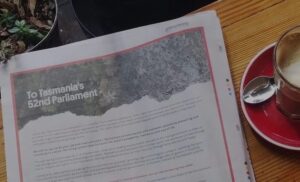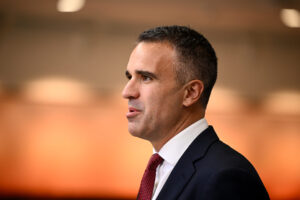In June, a joint Parliamentary Committee published recommendations that would significantly reform Australian electoral law.
Key recommendations arising from the 2022 federal election include lowering the threshold for disclosure of donations to $1000, ‘real time’ disclosure for parties and candidates, expanding the definition of ‘gift’ to improve transparency, increased public funding, and introducing truth in political advertising laws.
The release of this report is timely for Tasmania. Five years after the Tasmanian Government promised to introduce a Tasmanian political donations disclosure regime, debate to finalise such legislation is – hopefully – imminent. Legislation to establish a new donation disclosure regime and ‘modernise’ Tasmania’s Electoral Act passed the Lower House late last year and could be passed by the Upper House by mid-August, if the government decides to bring on the debate. If these laws are going to be operational in time for the next election, the window to pass them is narrowing.
Until now, Tasmania has had a low bar for disclosure – no bar at all. Tasmania is the only state relying solely on Commonwealth legislation for disclosure of political donations, which means parties and candidates without a federal presence are not subject to any disclosure requirements.
However, the Tasmanian legislation as currently drafted does not go anywhere near creating a transparent, effective system. The disclosure threshold is currently too high, at $5000, disclosure timeframes are too long, the proposed public funding model will favour incumbent MPs over new entrants and there is nothing to address the spread of misinformation in political advertising. There is also a gaping loophole for third party campaigners, whereby they only need to disclose donations made within six months of an election. This makes the legislation virtually meaningless for regulating third parties as donations will simply be made outside that timeframe.
Tasmanians who witnessed the gaming lobby flood the 2018 election campaign with anti-Labor and pro-Liberal ads may wonder if spending caps could limit the influence of vested interests on elections. Caps on spending by parties, candidates and third parties (like advocacy groups, peak bodies and unions) have been proposed in the past, including by the Australia Institute. However, the experience with spending caps in other jurisdictions is that they can fail to effectively limit the influence of vested interests. Perhaps worse, spending caps on candidates can be a gift to major parties and incumbents, who need to spend less money on an election campaign because they already have high name recognition and receive taxpayer-funded advantages like their salary, staff, offices and travel allowances. At the federal level, the Australia Institute recently found the financial advantages of incumbency add up to $2.9 million per MP per election cycle, at a minimum. New entrants must spend more just to “catch up”.
This month, the Australia Institute identified five principles for political finance reform – including that independent and party-affiliated candidates should be on a level playing field and that taxpayer-funded advantages of incumbency need to be factored into the design of any “level playing field”. These principles should lead Tasmanian legislators as they weigh up the benefits and costs of spending caps.
Tasmania also has the opportunity to lead the nation by coming up with a targeted, fair model for public funding of election campaigns. The problem with other states’ public funding is that the money comes after the election campaign is over, when it is too late to spend it. Worth further consideration is the “multiple matching” model used by some states in the US, where small private donations are topped up with public funding. This model would encourage candidates to pursue many small donations from a variety of Tasmanians over a few big donations from vested interests; the model would also fund election campaigns in real time instead of after the voting is over.
On truth in political advertising, when the Tasmanian Government was asked to include provisions to prevent the spread of misinformation through political ads, they made excuses why they would not. Late last year the Australian Christian Lobby provided another example of why such laws are needed with their untrue and misleading political advertising implying the government was considering criminalising parents who question their children’s wish to change gender.
One of the government’s excuses for not introducing truth in political advertising laws was that it would be premature to act before to the outcome of the inquiry into the 2022 federal election. Although not final, the interim federal report is clear. Numerous submissions from academics, MPs, political parties, community sector organisations and individuals called for laws to prohibit lies and misinformation in political ads.
Around the world, democracies are struggling to address disinformation and misinformation. Political ads that are misleading are part of the problem. Truth is fundamental to democracy. The public needs to be able to make informed decisions about who and which parties they want to represent them.
Whether it is the timeframe or threshold for disclosure, closing the third party loophole or stopping misleading and deceptive political advertising, Tasmanian MPs should strengthen the laws before them to keep pace with standards being developed nationally. Done well, these reforms have the potential to help level the playing field, encourage participation, and improve diversity in our democracy.
Between the Lines Newsletter
The biggest stories and the best analysis from the team at the Australia Institute, delivered to your inbox every fortnight.
You might also like
Open Letter to the Tasmanian Government
The Australia Institute and 30 other organisations from around Tasmania have published an open letter with 10 asks for the environment from whomever forms Tasmania’s next government. When cross-benchers and major parties have struck successful power-sharing agreements elsewhere, they covered policy as well as procedure, making now the ideal time for progress.
Six reforms to fix Australia’s new, deeply flawed political finance regime
The Australia Institute, The Centre for Public Integrity, the Australian Democracy Network and Transparency International Australia have come together to identify six key reforms to redress the unfairness created by the Commonwealth’s new political finance laws, and make real progress on combatting the influence of vested interests on the exercise of public power.
South Australia’s leap into the unknown with political finance changes
July 1 marked a dramatic change in how political parties and candidates are funded in South Australia.


